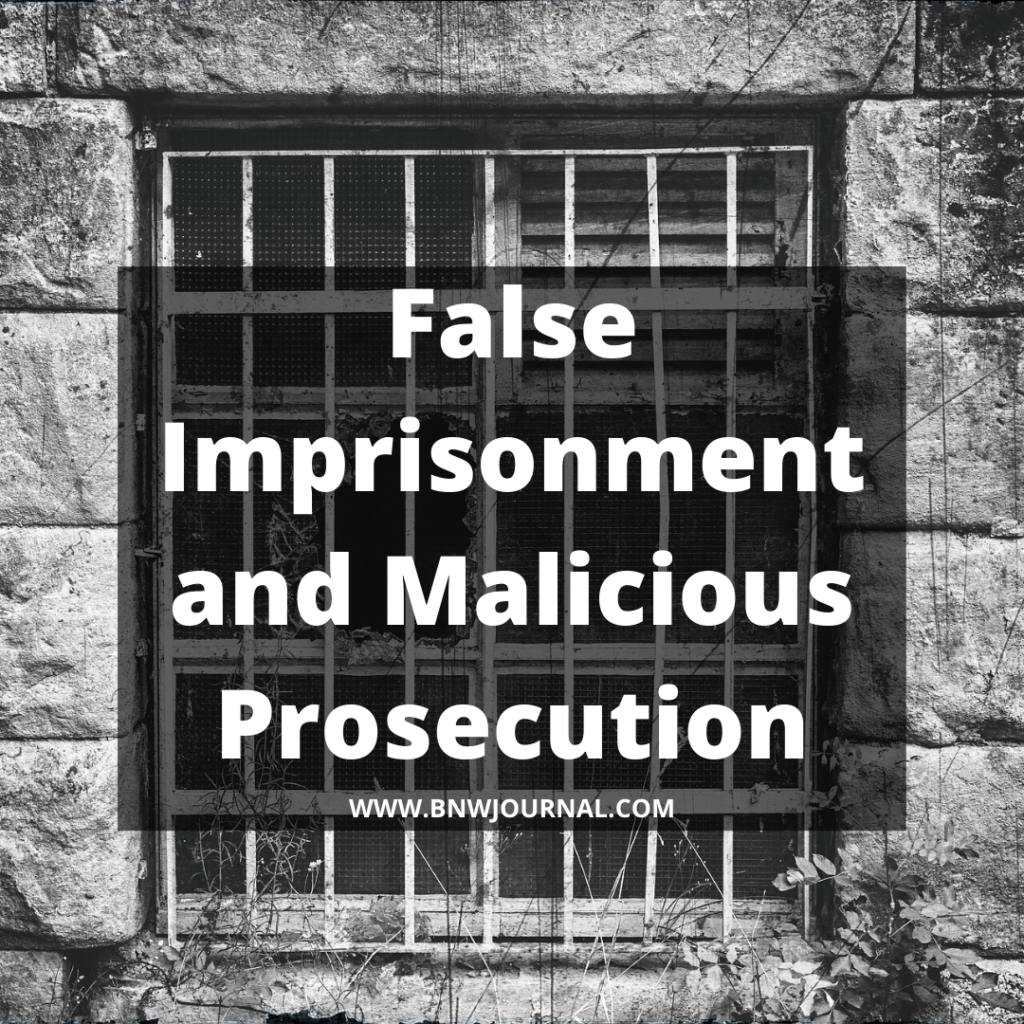![]()
Meaning and Definition of False Imprisonment
False imprisonment is a tort of a trespass towards a person.
In the tort of false imprisonment a person is deprived of his total personal liberty, such deprivation maybe for a long time or for a short time therefore the time factor may be immaterial.

The tort of false imprisonment can be defined as a deprivation of the total personal liberty of a person by another person. It must be without lawful justification. Such deprivation of liberty may be cause by totally restraining him from moving in any direction.
Essential condition
In order to constitute the tort of false imprisonment, the following conditions are necessary -:
- There must be total restraint on the liberty of the person.
- Such restraint must be without any lawful justification.
I. Total Restraint
In the position of total restraint on the personal liberty of a person is an essence of tort of false imprisonment. Thus in order to constitute the tort of false imprisonment, there must be restraint and such restraint must be total. It becomes a total restraint when a person is prevented from going beyond certain circumscribed limits or in any direction. There shall be no false imprisonment if a person is not prevent from going in a particular direction. But he is free to go in any other direction. Thus the law of tort does not recognize the partial restrain as a tort.
Bird versus Jones [1]is a good illustration on this point-
In this case, the plaintiff fail in his action for the tort of false imprisonment. Because there was no total restraint. The time duration for which the release train is made is not material. Thus the restraint maybe for a long time or for a very short time. The note point that the boundaries of the roof are not require and the restraint may be impose even in an open place. A person may be restrained within his own house also. There shall be no tort of false imprisonment if there are reasonable means to escape.
Reasonable means to escape means there must not be a likelihood of injury in stepping.
Importance of knowledge
Regarding forced imprisonment, a question arises whether the knowledge about his confinement to the confined person is necessary or not.
This question has been considered by the English code for the first time in Heering versus Boil.
The court said that such knowledge is essential for this tort. In Meering versus Graham White Aviation company that that knowledge of imprisonment is not an essential element.
Buy these two decisions The controversy has been substituted in an unsolved manner till now.
The correct view is that the false imprisonment under the law of tort gives the right to Civil liability. Therefore, knowledge about confinement should be regard as an essential element in order to constitute the tort of false imprisonment.
II. Without any Lawful justification
It is also necessary that restraining must be without any lawful justification.
In easy words, there must not be any lawful or justifiable cause behind the restraint.
If there is lawful justification or cause behind the restrain. No action can be brought against a person who makes confinement.
Definition and Meaning of Malicious Prosecution
Malicious prosecution arises when the prosecution was brought by a person against another person under criminal law, without any reasonable cause or ground.
But for this, it is necessary that a person who is plaintive in the proceeding for the tort of malicious prosecution must have been appointed by the court on the ground that there was no reasonable ground to prosecute him.
That the tort of malicious prosecution is a civil proceeding under which the victim who has prosecuted claim for damage is malicious prosecution.
In this way, the tort of malicious prosecution means a civil proceeding started by a person for damages against another person on the ground that he was maliciously prosecuted without any reasonable ground and the court has acquitted him on their bases.
Essential conditions
In order to Institute, a civil proceeding for malicious prosecution following conditions are necessary -:
- The plaintiff must have been prosecuted by the defendant in a previous criminal proceeding.
- The prosecution must have been without any reasonable cause of ground and due to malice.
- The plaintiff who was accused in the previous criminal proceeding must have been acquainted by Court on the ground that the proceeding was initiated without any reasonable ground.
I. Previous Prosecution
The basis of civil proceedings for malicious prosecution is the previous prosecution of plaintive as an accused person.
If there was no prosecution, no ground of initiating this proceeding arises.
Without reasonable cause and maliciously it is noticeable that to start criminal prosecution against a person does not give ground to Institute a suit for the tort of malicious prosecution.
For this, it is necessary that the proceeding initiate by the defendant again the plaintiff in the previous prosecution must have without any visible ground and with a malicious objective.
In the Kamta Prasad v National Buildings Constructions Corporation Pvt Ltd.[2]The officer of the respondent corporation found certain articles missing while preparing an inventory and checking up with the stock register. The plaintiff was prosecuted under sec. 403 of the I.P.C. but was given the benefit of doubt and hence acquit. The plaintiff brought an action for malicious prosecution. The plaintiff could not prove that he had been harassed by the officers. There was held to be reasonable and probable cause for prosecution of the plaintiff and the4 fact that the plaintiff was not harassed indicated that there was no malice and hence the charge was not held.
II. Acquittal of the Plaintiff
The cause of action arises for the proceeding of this tort, only if the plaintiff was appointed in the criminal proceeding.
Conclusion
False imprisonment maybe because of the malicious intent of the defendant or by negligence but the sufferer is the plaintiff, hence while awarding the compensation one must keep in mind about the place of confinement, time of confinement, and force used by the defendant. The above-mentioned considerations will confirm that the aggrieved person gets fair justice.
False imprisonment also violates Article 21 of the Indian Constitution which includes the right to life and personal liberty. Any person who is wrongfully imprisone can take legal action against the wrongdoer for the violation of their fundamental right. Under Article 21 we have the fundamental right to move freely, if any person is restraining the fundamental right then he can be sued in a court of law.
Malicious prosecution is an abuse of the process of the court by wrongfully setting the law in motion on a criminal charge. To get success the plaintiff must prove that there was a prosecution without any just and reasonable cause. It is initiate by malice and the case decide in the plaintiff’s favour. It is necessary to prove that damages were incurr by the plaintiff as a result of the prosecution. The burden of proof rests on him. He has to prove the existence of malice.
Malice may be prove by previously staine relations, unreasonable and improper conduct. Like advertising the charge or getting up false evidence.
Though mere carelessness is not the per se proof of malice, unreasonable conduct like haste, recklessness, or failure to make enquiries would be some evidence. Malicious prosecution is an abuse of the process of the court by wrongfully setting the law in motion on a criminal charge. It is an effort to disturb the proper functioning of the judicial machinery.
References:
[1] [1845] 7 QB 742
[2]A.I.R. 1992 Delhi 275



0 Comments